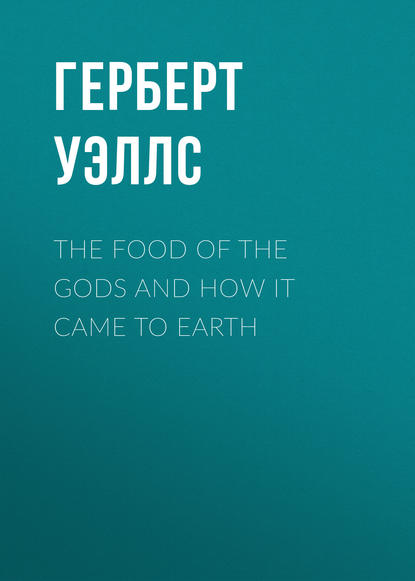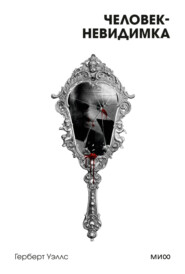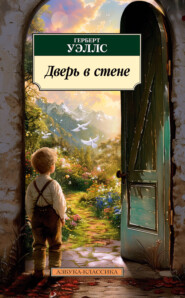По всем вопросам обращайтесь на: info@litportal.ru
(©) 2003-2024.
✖
The Food of the Gods and How It Came to Earth
Настройки чтения
Размер шрифта
Высота строк
Поля
"Hang Winkles!" said Redwood.
"You might get at Winkles and give him powders to give the child – "
"That's about what I shall have to do," said Redwood, resting his chin on his fist and staring into the fire.
Bensington stood for a space smoothing the down on the breast of the giant chick. "They will be monstrous fowls," he said.
"They will," said Redwood, still with his eyes on the glow.
"Big as horses," said Bensington.
"Bigger," said Redwood. "That's just it!"
Bensington turned away from the specimen. "Redwood," he said, "these fowls are going to create a sensation."
Redwood nodded his head at the fire.
"And by Jove!" said Bensington, coming round suddenly with a flash in his spectacles, "so will your little boy!"
"That's just what I'm thinking of," said Redwood.
He sat back, sighed, threw his unconsumed cigarette into the fire and thrust his hands deep into his trousers pockets. "That's precisely what I'm thinking of. This Herakleophorbia is going to be queer stuff to handle. The pace that chick must have grown at – !"
"A little boy growing at that pace," said Mr. Bensington slowly, and stared at the chick as he spoke.
"I Say!" said Bensington, "he'll be Big."
"I shall give him diminishing doses," said Redwood. "Or at any rate Winkles will."
"It's rather too much of an experiment."
"Much."
"Yet still, you know, I must confess – … Some baby will sooner or later have to try it."
"Oh, we'll try it on some baby – certainly."
"Exactly so," said Bensington, and came and stood on the hearthrug and took off his spectacles to wipe them.
"Until I saw these chicks, Redwood, I don't think I began to realise – anything – of the possibilities of what we were making. It's only beginning to dawn upon me … the possible consequences…"
And even then, you know, Mr. Bensington was far from any conception of the mine that little train would fire.
IV
That happened early in June. For some weeks Bensington was kept from revisiting the Experimental Farm by a severe imaginary catarrh, and one necessary flying visit was made by Redwood. He returned an even more anxious-looking parent than he had gone. Altogether there were seven weeks of steady, uninterrupted growth…
And then the Wasps began their career.
It was late in July and nearly a week before the hens escaped from Hickleybrow that the first of the big wasps was killed. The report of it appeared in several papers, but I do not know whether the news reached Mr. Bensington, much less whether he connected it with the general laxity of method that prevailed in the Experimental Farm.
There can be but little doubt now, that while Mr. Skinner was plying Mr. Bensington's chicks with Herakleophorbia IV, a number of wasps were just as industriously – perhaps more industriously – carrying quantities of the same paste to their early summer broods in the sand-banks beyond the adjacent pine-woods. And there can be no dispute whatever that these early broods found just as much growth and benefit in the substance as Mr. Bensington's hens. It is in the nature of the wasp to attain to effective maturity before the domestic fowl – and in fact of all the creatures that were – through the generous carelessness of the Skinners – partaking of the benefits Mr. Bensington heaped upon his hens, the wasps were the first to make any sort of figure in the world.
It was a keeper named Godfrey, on the estate of Lieutenant-Colonel Rupert Hick, near Maidstone, who encountered and had the luck to kill the first of these monsters of whom history has any record. He was walking knee high in bracken across an open space in the beechwoods that diversify Lieutenant-Colonel Hick's park, and he was carrying his gun – very fortunately for him a double-barrelled gun – over his shoulder, when he first caught sight of the thing. It was, he says, coming down against the light, so that he could not see it very distinctly, and as it came it made a drone "like a motor car." He admits he was frightened. It was evidently as big or bigger than a barn owl, and, to his practised eye, its flight and particularly the misty whirl of its wings must have seemed weirdly unbirdlike. The instinct of self-defence, I fancy, mingled with long habit, when, as he says, he "let fly, right away."
The queerness of the experience probably affected his aim; at any rate most of his shot missed, and the thing merely dropped for a moment with an angry "Wuzzzz" that revealed the wasp at once, and then rose again, with all its stripes shining against the light. He says it turned on him. At any rate, he fired his second barrel at less than twenty yards and threw down his gun, ran a pace or so, and ducked to avoid it.
It flew, he is convinced, within a yard of him, struck the ground, rose again, came down again perhaps thirty yards away, and rolled over with its body wriggling and its sting stabbing out and back in its last agony. He emptied both barrels into it again before he ventured to go near.
When he came to measure the thing, he found it was twenty-seven and a half inches across its open wings, and its sting was three inches long. The abdomen was blown clean off from its body, but he estimated the length of the creature from head to sting as eighteen inches – which is very nearly correct. Its compound eyes were the size of penny pieces.
That is the first authenticated appearance of these giant wasps. The day after, a cyclist riding, feet up, down the hill between Sevenoaks and Tonbridge, very narrowly missed running over a second of these giants that was crawling across the roadway. His passage seemed to alarm it, and it rose with a noise like a sawmill. His bicycle jumped the footpath in the emotion of the moment, and when he could look back, the wasp was soaring away above the woods towards Westerham.
After riding unsteadily for a little time, he put on his brake, dismounted – he was trembling so violently that he fell over his machine in doing so – and sat down by the roadside to recover. He had intended to ride to Ashford, but he did not get beyond Tonbridge that day…
After that, curiously enough, there is no record of any big wasps being seen for three days. I find on consulting the meteorological record of those days that they were overcast and chilly with local showers, which may perhaps account for this intermission. Then on the fourth day came blue sky and brilliant sunshine and such an outburst of wasps as the world had surely never seen before.
How many big wasps came out that day it is impossible to guess. There are at least fifty accounts of their apparition. There was one victim, a grocer, who discovered one of these monsters in a sugar-cask and very rashly attacked it with a spade as it rose. He struck it to the ground for a moment, and it stung him through the boot as he struck at it again and cut its body in half. He was first dead of the two…
The most dramatic of the fifty appearances was certainly that of the wasp that visited the British Museum about midday, dropping out of the blue serene upon one of the innumerable pigeons that feed in the courtyard of that building, and flying up to the cornice to devour its victim at leisure. After that it crawled for a time over the museum roof, entered the dome of the reading-room by a skylight, buzzed about inside it for some little time – there was a stampede among the readers – and at last found another window and vanished again with a sudden silence from human observation.
Most of the other reports were of mere passings or descents. A picnic party was dispersed at Aldington Knoll and all its sweets and jam consumed, and a puppy was killed and torn to pieces near Whitstable under the very eyes of its mistress…
The streets that evening resounded with the cry, the newspaper placards gave themselves up exclusively in the biggest of letters to the "Gigantic Wasps in Kent." Agitated editors and assistant editors ran up and down tortuous staircases bawling things about "wasps." And Professor Redwood, emerging from his college in Bond Street at five, flushed from a heated discussion with his committee about the price of bull calves, bought an evening paper, opened it, changed colour, forgot about bull calves and committee forthwith, and took a hansom headlong for Bensington's flat.
V
The flat was occupied, it seemed to him – to the exclusion of all other sensible objects – by Mr. Skinner and his voice, if indeed you can call either him or it a sensible object!
The voice was up very high slopping about among the notes of anguish. "Itth impothible for uth to thtop, Thir. We've thtopped on hoping thingth would get better and they've only got worth, Thir. It ithn't on'y the waptheth, Thir – thereth big earwigth, Thir – big ath that, Thir." (He indicated all his hand and about three inches of fat dirty wrist.) "They pretty near give Mithith Thkinner fitth, Thir. And the thtinging nettleth by the runth, Thir, they're growing, Thir, and the canary creeper, Thir, what we thowed near the think, Thir – it put itth tendril through the window in the night, Thir, and very nearly caught Mithith Thkinner by the legth, Thir. Itth that food of yourth, Thir. Wherever we thplathed it about, Thir, a bit, it'th thet everything growing ranker, Thir, than I ever thought anything could grow. Itth impothible to thtop a month, Thir. Itth more than our liveth are worth, Thir. Even if the waptheth don't thting uth, we thall be thuffocated by the creeper, Thir. You can't imagine, Thir – unleth you come down to thee, Thir – "
He turned his superior eye to the cornice above Redwood's head. "'Ow do we know the ratth 'aven't got it, Thir! That 'th what I think of motht, Thir. I 'aven't theen any big ratth, Thir, but 'ow do I know, Thir. We been frightened for dayth becauth of the earwigth we've theen – like lobthters they wath – two of 'em, Thir – and the frightful way the canary creeper wath growing, and directly I heard the waptheth – directly I 'eard 'em, Thir, I underthood. I didn't wait for nothing exthept to thow on a button I'd lortht, and then I came on up. Even now, Thir, I'm arf wild with angthiety, Thir. 'Ow do I know watth happenin' to Mithith Thkinner, Thir! Thereth the creeper growing all over the plathe like a thnake, Thir – thwelp me but you 'ave to watch it, Thir, and jump out of itth way! – and the earwigth gettin' bigger and bigger, and the waptheth – . She 'athen't even got a Blue Bag, Thir – if anything thould happen, Thir!"
"But the hens," said Mr. Bensington; "how are the hens?"
"We fed 'em up to yethterday, thwelp me," said Mr. Skinner, "But thith morning we didn't dare, Thir. The noithe of the waptheth wath – thomething awful, Thir. They wath coming ont – dothenth. Ath big ath 'enth. I thayth, to 'er, I thayth you juth thow me on a button or two, I thayth, for I can't go to London like thith, I thayth, and I'll go up to Mithter Benthington, I thayth, and ekthplain thingth to 'im. And you thtop in thith room till I come back to you, I thayth, and keep the windowth thhut jutht ath tight ath ever you can, I thayth."
"If you hadn't been so confoundedly untidy – " began Redwood.
"Oh! don't thay that, Thir," said Skinner. "Not now, Thir. Not with me tho diththrethed, Thir, about Mithith Thkinner, Thir! Oh, don't, Thir! I 'aven't the 'eart to argue with you. Thwelp me, Thir, I 'aven't! Itth the ratth I keep a thinking of – 'Ow do I know they 'aven't got at Mithith Thkinner while I been up 'ere?"
"And you haven't got a solitary measurement of all these beautiful growth curves!" said Redwood.
"I been too upthet, Thir," said Mr. Skinner. "If you knew what we been through – me and the mithith! All thith latht month. We 'aven't known what to make of it, Thir. What with the henth gettin' tho rank, and the earwigth, and the canary creeper. I dunno if I told you, Thir – the canary creeper …"
"You've told us all that," said Redwood. "The thing is, Bensington, what are we to do?"
"What are we to do?" said Mr. Skinner.

















